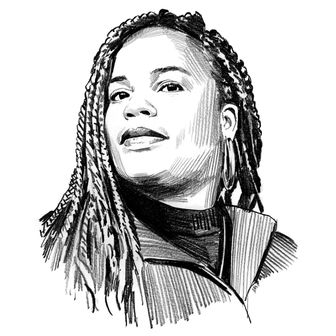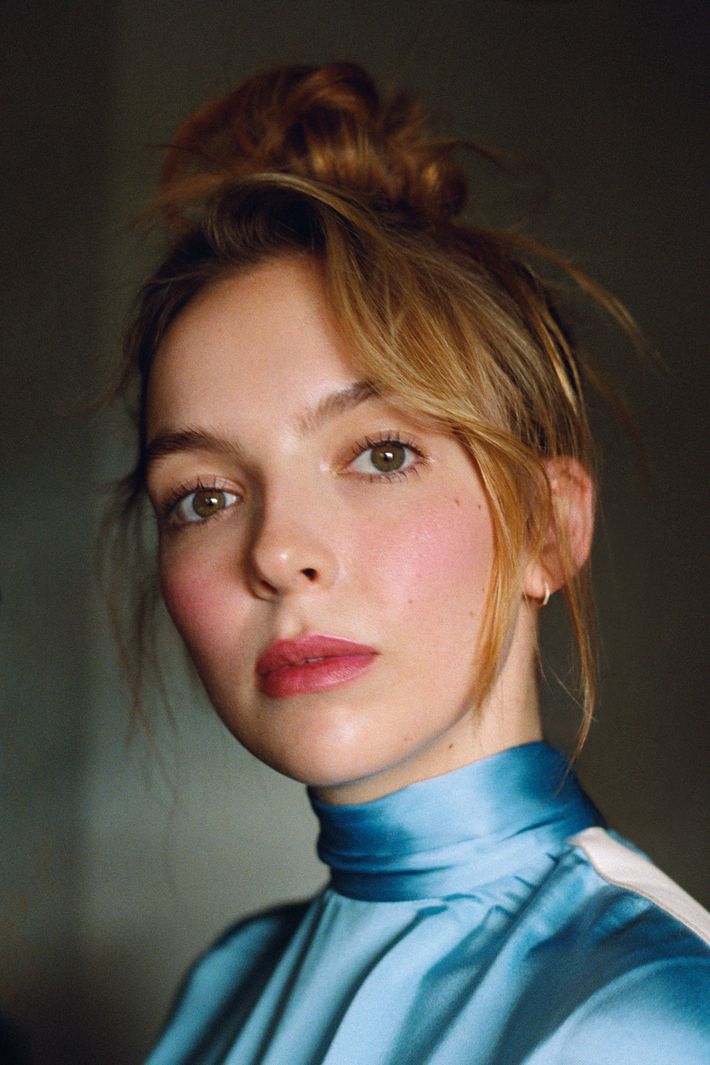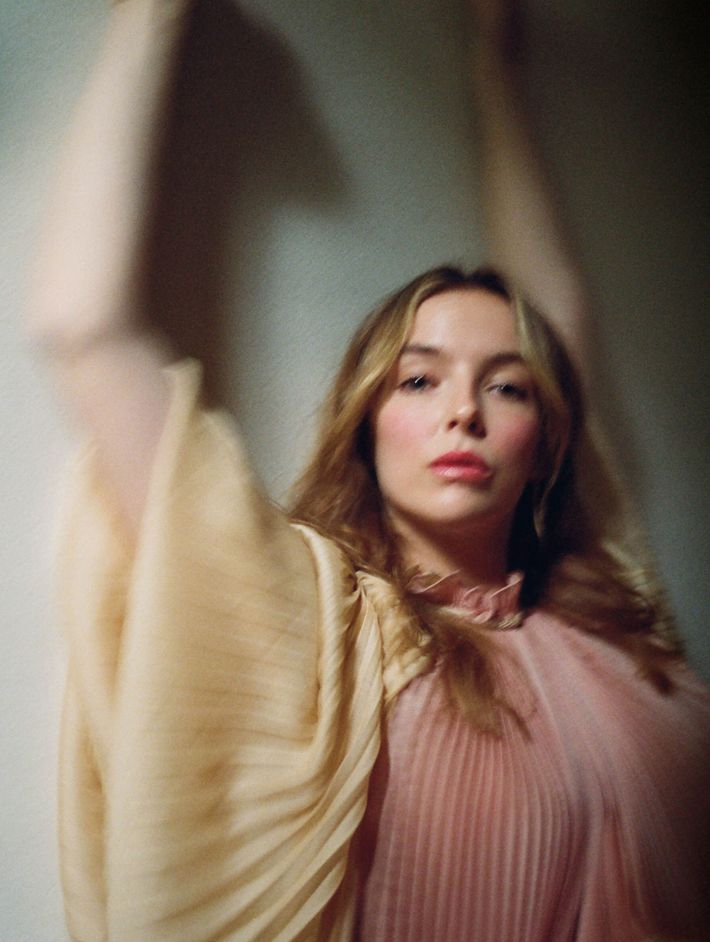A strange man sitting at the table next to — and apparently within smelling range — of Jodie Comer has just leaned a little farther in, his sense of smell activated by an odor wafting his way. “Excuse me,” he murmurs into her ear, unsure if he should. “What perfume are you wearing? Is it … it smells so familiar.”
Comer is delighted. “Oh, it’s a bit strong, innit? It’s Santal 33! I doused myself in it when I got ready,” she exclaims in a dense Liverpudlian accent. As they exchange some niceties about sandalwood and cedar and Le Labo, a feeling hovers just outside of my rational thought. Villanelle, the assassin Comer plays on Killing Eve, once used perfume as a fatal nerve agent. Watching this scene now unfold in real life, it’s not that I think, Will she assassinate him? But there is something about the exchange that feels lifted directly from the show’s script.
And fine, okay, I do briefly wonder if she might assassinate him. Comer, 25, has become so recognizable from her role on the wickedly fun and sexy spy drama that I’m not alone. Earlier, she told me a story about a couple she’d met in Barcelona who made her promise she wasn’t going to murder them before they bought her a shot. As Villanelle, a skilled killer employed by a shadow organization who fixates on the bored M15 officer hunting her down (Sandra Oh), Comer pulled off perhaps the most captivating performance on TV last year: that of a vicious sociopath so cheeky we couldn’t help but root for her — and hope her character is still alive when the second season returns April 7.
Comer’s invited me to see a vest-wearing celebrity magician, Dan White, perform at Nomad Hotel theater, a first for us both. The act hasn’t even started, and she’s already thoroughly tickled by the details we’d encountered: the completely silent, expressionless woman in white who directed us to our seats (“That was so weird! Do you think she’s an actress?”), the old-timey set, the Frank Ocean–heavy preshow playlist, the fact that we’re at a magic show at all (“I don’t trust magicians!”).
Despite the tantalizing promise of levitation in our near future, it feels like any other slightly basic Saturday night in the city — we’re rapidly drinking disappearing goblets of Chablis, eating fistfuls of complimentary popcorn for dinner. (“Oh! It’s truffle!” she marvels, as she frequently brushes fallen kernels off the folds of her Eileen Fisher–esque sweater.) As we sit shoulder to shoulder at the tiny table, she chatters away about the time she got bedbugs in L.A. and had to attend meetings awkwardly trying not to scratch herself. I start to realize what it is that lets her play Villanelle with such ease. Often when a seemingly normal person convincingly plays a serial killer or sociopathic assassin, you wonder: What hidden, dark, twisted impulses has the actor set free for the performance? What terrifying part of his subconscious did Christian Bale dive into to play Patrick Bateman in American Psycho? Was it just a mullet wig that got Charlize Theron into the mind of Aileen Wuornos for Monster, or something more sinister? Comer has flipped that. She isn’t tapping into a well of recessed malevolence, she’s infusing the sociopathy with her own levity, playfulness, and free-spiritedness. (Still, though, she insists Villanelle is a much weirder woman than she is.) Comer wouldn’t kill, but her Villanelle absolutely would wear Santal 33, the scent of hotel lobbies in Tulum and girls who guzzle iced matcha lattes with almond milk.
When Comer first got the email from her agent about the role of Villanelle, she admits she was skeptical. “I’m not a slinky, leopard, full-on catsuit assassin. I didn’t feel like I had that in me.” But Comer hadn’t realized that this was a female assassin written by Fleabag’s devastatingly sharp Phoebe Waller-Bridge, who doesn’t just write “complicated women.” She writes women who provoke empathy, no matter how questionable their actions. Waller-Bridge’s style complements the way Comer has elicited compassion for characters you’d otherwise forget or hate — whether as the mistress who leaves a long blonde hair on a cheating husband’s sleeve in Dr. Foster, or the popular friend who triggers body issues on My Mad Fat Diary.
And so, after reading the Killing Eve script, Comer realized Villanelle was a dangerously violent criminal she’d like to go shopping with. “I found myself saying, ‘Oh! I like this because I can relate to her!’”
Which is exactly what Waller-Bridges wanted from her psycho killer: “Somebody with friendliness and warmth to off-set the ol’ murderous psychopath vibes,” she explains in an email. “The more innocent and playful she appeared to be, the more impact her brutality would have. I desperately wanted to avoid her being a moody, machine-like, angular, cat-woman we’ve seen so many times before in tv and film. So you can imagine our relief when Jodie rocked up with her if-puppies-could-kill performance and simultaneously charmed and terrified us.” In the role, Comer treats an assassin’s life — with its sinister figures and violence and constant danger — like she’s a bratty teenager let loose at the mall. She brutally smiles, and laughs, and makes goofy faces, and strolls innocently through parks, in a way that’s uncannily familiar — relatable, as they call it in Hollywood. I’ve often found myself saying, “Well, I guess I would have done that too,” when she, say, cruelly flicks ice cream on a randomly adorable child or slits someone’s throat.
The lights dim, the show begins, and after a series of card tricks that Comer gleefully oooohs at, White, the magician, begins to perform a complicated mind game that involves guessing the exact word, on the exact page, in a book selected by an audience volunteer. When he correctly guesses it, television’s deadliest assassin nudges me sharply between the ribs in excitement and hisses, “Oy! Have you ever read Harry Potter?”
As it is for so many infamous killers, early adolescent rejection was the catalyst for Comer’s career. When she was a 12-year-old in Woolton, Liverpool, where she grew up, she was slated to perform “Cell Block Tango,” a “wildly inappropriate” song from Chicago, with three of her friends at a school talent show. During the rehearsal period, her parents took her on vacation. Her friends, perhaps resentful that Jodie was off enjoying sunshine and pools, told her she was no longer in the dance. (“You know when you’re younger and you cry and you lose your breath and you’re gonna die?” Comer recalls. “That was the level of trauma.”) At the suggestion of her mom, Comer, who had already been active in local theater, decided to enter the talent show on her own, and perform a monologue from a play written by an area playwright. She won. Based on that performance, her theater teacher then recommended she audition for the lead in a BBC radio drama. She got that, then an agent, and by 16, while she was still in school joyously getting C’s in math class, Comer landed her first real role on a TV show, in My Mad Fat Diary. Which led to increasingly bigger roles on BBC Drama’s Thirteen, Dr. Foster, then The White Princess, where she played Young Queen Elizabeth. Then finally, she got the call for Killing Eve.
She’d never watched Grey’s Anatomy before she walked into a dingy office in L.A for a chemistry test with Sandra Oh, with Waller-Bridge watching on Skype. The scene they read, from episode five, “Face Off,” was the pivotal moment when Oh’s Eve and Comer’s Villanelle finally meet after a long, slow-building mutual obsession, and have a dinner of leftover shepherd’s pie. Oh brought props. She set a table. She had Tupperware, and shepherd’s pie for them to eat. She even had drinks. By the end, it felt like they’d filmed the show for real. It was clear then to Waller-Bridge that Comer had the part, but it wasn’t until a few weeks into filming that Comer knew how to play her.
Her grandmother had just died, she recalls, and it was her first day back on set after the funeral. They were filming what is now an iconic image from the first season, the one that inspired Villanelle Halloween costumes: Comer, sitting on her therapist’s couch, almost swallowed up by a frothy, Starburst-pink tulle dress by Molly Goddard, and black Balenciaga combat boots. “I felt really distracted, very disconnected, wasn’t sure what I was doing, was having a really stressed time,” she says. But she also felt a freedom that was one second away from a swan dive into nihilism. She felt like Villanelle.
People who are captivated by Comer’s face onscreen often point to her poreless, symmetrical, saucer-eyed, full-lipped, Pre-Raphaelite beauty. But it’s not her beauty that makes watching her so interesting. It’s her willingness to pull faces, to test the elasticity of her skin and stretch her eyes and mouth into melodramatic pouts, childlike grins, and anguished grimaces that broadcast all the way to space. While sitting with Comer during the magic show, I sense every moment of shock, awe, disbelief, and skepticism she feels during the levitation act, as do the people sitting around us.
During intermission, a hotel employee comes and invites us to a bathroom turned Black Forest–themed bar for VIP guests. We’re served martinis — Comer’s first ever — and left to talk in a black-light-lit room for two. It could ALMOST be a date, I say. Comer stops Snapchatting for a moment and smiles at me. “We can be each other’s dates!” she offers, gamely playing with the boundaries of our new friendship.
The most addictive element on a show full of possible addictions is the cat-and-mouse between Villanelle and Eve. Villanelle is bisexual, and so her fascination with Eve is driven, unabashedly, by lust, in addition to a whole year-of-therapy’s worth of other motivations. Does Villanelle need Eve to submit to her desires? Does Eve just need the excitement? Is it maternal? Is it sexual? Is it respect? Is it all of it? Sometimes it’s a psychosexual, sometimes it’s more like a screwball romance, but either way, the two need each other, the same way De Niro needed Pacino in Heat, and vice versa. Their obsession is mutual. (“I think about you all the time,” Eve tells Villanelle in the season one finale. “I masturbate to you a lot,” Villanelle replies.)
All of this sexual tension is built without Oh and Comer even sharing that much screen time — it all takes place offscreen and in their minds. “It’s all psychological, the way they play with each other,” Comer explains. It’s effective. There’s a scene midway through the first season, probably the most intimate scene of the show, and frankly, one of the most erotic moments from a TV show in recent years. Villanelle steals Eve’s suitcase and replaces all of her clothes with luxurious clothes and perfume she’s carefully, lovingly, selected for her. Eve runs her hands over every item, she tries on the clothes, she sprays the perfume, she gazes at herself in the mirror, seeing herself as the object of Villanelle’s desire. “Phoebe was like, what’s better than someone knowing what looks fucking perfect on you?” Comer explains. “Someone picking out something rich, expensive, exquisite, and perfect for your body, and then handing it over to you, and you put it on and it’s just like fuck,” she groans, and takes a big gulp of her martini. Comer herself has never had a connection like the one Villanelle has with Eve — obsessive, compulsive, Sapphic, but still, she finds common ground with even Villanelle’s most destructive compulsions. “Villanelle is a hopeless romantic, like me,” she says, as if a sociopath stalking the spy hired to take her down is the greatest love story of our time. And maybe she’s right.
Killing Eve returns to BBC America on April 7.
*A version of this article appears in the March 18, 2019, issue of New York Magazine. Subscribe Now!






